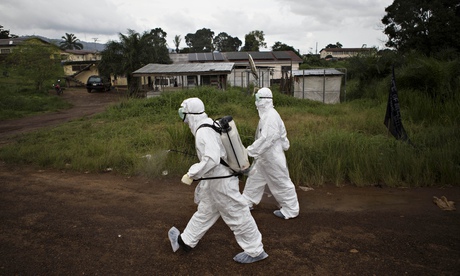
The Ministry of Defence is to deploy 600 extra military personnel to Sierra Leone next week to help combat Ebola.
They will join 150 already in place and will be backed up by a ship, planes and helicopters.
The decision was made at a Cobra meeting in Downing Street on Wednesday.
The Guardian understands they are deploying troops, helicopters and a ship – army medics and Merlin helicopters, supported by Royal Fleet Auxiliary Argus – to provide direct support and reassurance.
Much of the focus of the deployment is helping to establish Ebola treatment centres and an Ebola training academy.
They will reinforce engineers and planes already on the ground constructing the Kerry Town Ebola treatment unit. They will help in the training of healthcare workers, hygienists and others at a World Health Organisation Ebola training centre, including 200 military personnel to help run the site.
Three Navy Merlin helicopters and crew plus engineers will be sent to move staff around. The Argus will be used in support as a forward operating base for the helicopters.
The department of international development is taking the lead in the British effort, which includes a commitment to build at least four new Ebola treatment facilities with a total of 700 beds near Port Loko, Freetown, Makeni and Bo.
The extra personnel announced on Wednesday will also help support Sierra Leone’s over-stretched public health service, with the aim of helping up to almost 9,000 patients over a six-month period.
Military personnel will deploy to Sierra Leone next week where they will join military engineers and planners who have been in the country for almost a month, overseeing the construction of the medical facilities.
